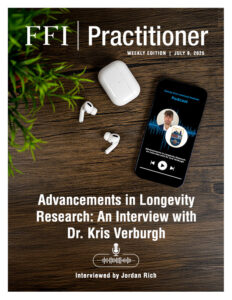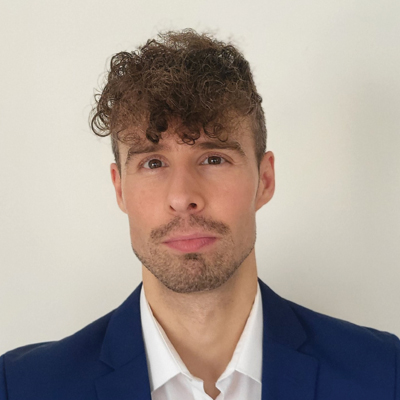
View this edition in our enhanced digital edition format with supporting visual insight and information.
FFI Practitioner is pleased to feature a podcast conversation with Dr. Kris Verburgh, who presented the keynote at the 2019 Global Conference. In today’s interview, Dr. Verburgh discusses the advancements in longevity research since his 2019 keynote, highlighting significant investments to address aging-related diseases. He also explores the ways in which a shift towards an ageless society would affect family businesses, investment strategies, and societal organization.
Dr. Verburgh’s colleague Robert Nail will present the opening keynote at the 2025 Global Conference, entitled “Exponential Thinking in the Multi-Generational Family Enterprise: Innovation, Technology, and the Future.”
Podcast Transcript
Jordan Rich: Hello and welcome to the latest issue of the FFI Practitioner podcast. I’m Jordan Rich. Today we welcome Dr. Kris Verburgh. He’s the author of The Longevity Code. He’s a venture capitalist as well as an MD, and he delivered the 2019 keynote at the FFI Miami conference. On this podcast, he’ll bring us up to date since he spoke in Miami. Dr. Verburgh, let’s focus first of all on what’s happened since 2019, when you gave the keynote at the FFI Miami conference. What’s happened, in terms of longevity, in terms of the research? We know how fast things move technically. Where are we six years later?
Dr. Kris Verburgh: The field is maturing even further, and we have seen an influx of more and more investments. A classic example is perhaps Altos Labs, which received $3 billion of investment trying to reverse aging, or at least to address aging-related diseases much more effectively and ideally even preventively. I think in the last few years, we have seen the longevity field coming more to maturation and attracting more and more interest of investors, as well as scientists and universities, and even countries. Some countries are even trying to focus more on keeping a population as healthy as possible, and the best way to do that is by addressing the root cause of diseases, which are mainly aging. So aging is, let’s say, a root cause of most aging-related diseases like heart disease, Alzheimer’s disease, Parkinson’s disease, cancer, macular degeneration. I would say more investment, more focus on research, more esteemed scientists are moving into the field, and we are seeing more and more companies developing their pipelines further, trying to develop therapies that address more root causes of diseases.
JR: It’s not about just living longer. It’s about living with more wellness, with more radiant health, and enjoying the later years. Correct?
KV: That’s correct. The best way to keep people healthy for the longest time possible and to prevent all those aging-related diseases, or at least postpone them, not just years, but even decades, would be by addressing aging itself. There’s a paradigm shift that is still unfolding, and more and more people are realizing that, but not everyone. Even a lot of big pharma companies still think aging is something very different than Alzheimer’s disease, heart failure, hypertension, and many cancers. But we realize more and more that aging-related diseases are driven by inherent aging processes. If you slow down aging, you not only can prevent, treat, or even reverse aging-related diseases, but you also keep people healthier as we get older. You could slow down and even reverse aging. You would substantially postpone all those complaints we get as we get older, like muscle aches, osteoporosis, osteoarthritis, decline in kidney function, reduced mobility, brain fog, difficulty retrieving words and learning new things. All those things that we attribute to aging, they are caused by fundamental aging mechanisms, and if you address those, you can postpone and hopefully mitigate those symptoms of aging much better and treat aging-related diseases and prevent them.
JR: There is going to be an obvious impact on every aspect of the population once this really takes hold. But particularly, we want to get your take on family businesses, the audience that’s listening to this, and their advisors. When it comes to transitioning from one generation to the next, when it comes to leadership, succession, etc., how is it going to impact those factors?
KV: It’s very important, let me put it that way. We are seeing now the fourth industrial revolution. Now you’re talking about AI, robotics, cloud computing, and so on, but biotechnology is going to be another, very important aspect of this fourth industrial revolution. I think AI and biotech are going to transform the world and how we are going to plan our lives. Probably we will go to an ageless society where people would reach very high ages, perhaps 100 years, 120, or even more, and still look quite young. That’s the whole goal of aging research and longevity, and that’s also what we have seen being borne out by research. It’s possible not just to slow down aging, but even reverse aging. Old mice or rats, we can epigenetically reprogram them, and they look young again. These and many other studies show that it’s possible to not just slow down but even reverse the aging process. Some scientists and philosophers speculate we will go to an ageless society where, say, the family gatherings going to be very crowded, because you will have great-great-grandparents perhaps joining the table, still looking quite young.
Hopefully, at least, that’s the aim of a lot of companies and what also investors are aspiring to. The demographics are going to change, probably considerably. Secondly, it’s very important from an investment perspective. Longevity and health are going to be very important investment areas. In a way, health is already the biggest industry in the world. Countries spend 8 to 18% of their GDP on health, on healthcare. And the way to revolutionize healthcare is by addressing diseases at the root cause. Most diseases people get are aging-related diseases, at least in developed countries, so the best way to prevent and treat those diseases is by acting on the aging process itself. That’s the second point; it’s going to be a very important investment area. And thirdly, it’s going to impact society as a whole. If you can keep people even one year younger, healthier, and productive, it adds billions to the GDP of countries. It’s going to be super important from an economic perspective, but also for me as a medical doctor, trying to keep people healthy. The best way is by addressing aging itself. It’s going to be impactful on family planning, on how we are going to organize society, and from an investment and a medical perspective.
JR: There’s a lot of venture capital out there that’s really excited about jumping in, and they’re jumping in on a regular basis to support research.
KV: Yes indeed. We see the advent and the rise more and more of longevity-focused companies. Of course, investing in those companies is very risky, because a lot of those companies are at a very early stage. They are addressing disease more at the root cause, so that’s promising. That’s de-risking your investment, because you’re approaching it differently, not just trying to develop a drug that treats a symptom, like most drugs, but trying to develop a drug or a therapy that acts more on the root cause of disease. That’s an interesting approach, but because it’s often specific, novel technology addressing a quite novel fundamental aging pathway, it’s quite risky. And sometimes those companies are created by great scientists, but they’re not very good at building businesses. I think it’s a very promising field, but it’s a difficult field, and biotech itself is already a very difficult field for many reasons. Companies need millions and hundreds of millions of dollars of investment many years before they can bring a product to market, because you have to run clinical trials that take ten to fifteen years. It’s a very different business model, and a lot of drugs fail, sometimes even having gone through successful Phase One and Two trials, and then still fail in Phase Three. So, biotech is a very risky but very promising area, because if your drug succeeds, it’s often going to be a significant success. Biotech is risky, and longevity is even riskier. But the reward is quite high, because you’re addressing disease at the root cause.
JR: Finally, with all of the information available, the social media explosion, and everything that’s floating around the internet, books, and so forth: Do you have advice for those people, whether they’re individuals in companies and corporations, family businesses or advisors, about where to turn for solid information on this, where we’re going, how we’re getting there?
KV: I think today, it has never been easier to learn something about whatever subject you like. A good start is to read some review papers from Nature or Science about the hallmarks of aging. It’s a bit more difficult literature, because it’s a scientific review, but still, it’s quite digestible. I think that’s a good approach. [The] “Hallmarks of Aging” paper1—actually, there are two papers now, including an update,2 so it’s a great start. You have some good longevity books. Try to read some longevity books to get a different perspective. Of course, if you go online, it’s the Wild West. You have so many longevity hackers and biohackers peddling all these weird treatments, and I would be careful with that. Some of them are very popular on social media accounts and so on. But it’s a complicated field, and there are still a lot of misunderstandings out there: for example, that a high-protein diet is healthy, while we see in literally thousands of studies that too much protein accelerates aging. Of course, too little protein is also not good. But you have these people recommending high-protein, carnivorous, meat diets and so on, and many other weird diets and supplements are being advised despite a lot of great science already saying that probably the best diet is one where you reduce animal protein, eat more vegetables, consume less sugar and also less starchy food, and you have all kinds of longevity foods like blueberries, dark chocolate, and so on. If you know where to look for that and not just jump on the bandwagon of influencers, then if you do a bit more science-based, use ChatGPT, read some hallmarks of aging papers and some books of esteemed researchers, that can really go a long way.
JR: Thanks again to Dr. Kris Verburgh for this very informative conversation. For listeners who are attending or thinking about attending the FFI Annual Global Conference in Boston in October, Kris’s colleague Robert Nail will be presenting the opening keynote on “Exponential Thinking in the Multi- Generational Family Enterprise: Innovation, Technology, and the Future.” Go to www.ffi.org to get more information and to register for the conference. This is Jordan Rich, thanking you, as always, for listening.
References
1 López-Otín, Carlos, Maria A. Blasco, Linda Partridge, Manuel Serrano, and Guido Kroemer. “The Hallmarks of Aging.” Cell 153, no. 6 (2013): 1194–1217. https://doi.org/10.1016/j.cell.2013.05.039.
2 López-Otín, Carlos, Maria A. Blasco, Linda Partridge, Manuel Serrano, and Guido Kroemer. “The Hallmarks of Aging: An Expanding Universe.” Cell 186, no. 2 (2023): 243–278. https://doi.org/10.1016/j.cell.2022.11.001.
About the Contributor

Kris Verburgh, MD, is an inventor, author, investor, researcher, and medical doctor specializing in aging, longevity, and the future of medicine and biotechnology. Dr. Verburgh is a partner and head of science at the BOLD Longevity Growth Fund and a researcher at the Free University of Brussels. He is an expert in the future of medicine and longevity with FFI organizational member Singularity University, and he is a member of the FFI IberoAmérica Virtual Study Group.
Interviewer: Jordan Rich is celebrating a quarter century at one of America’s top legacy radio stations, interviewing thousands of celebrities, authors, actors and interesting personalities throughout his career. Jordan is co-owner of Chart Productions Inc., and teaches voice-over acting. His main focus these days is in podcast creation and production, featuring conversations with the world’s most creative people.

View this edition in our enhanced digital edition format with supporting visual insight and information.





